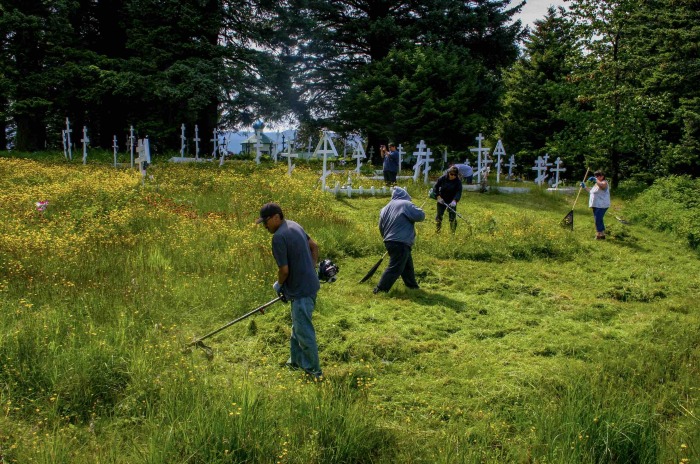Clean (to be) — Perinani; Eprinani
Nateq eprituq.—The floor is clean.

Photo: Ouzinkie residents clean the community cemetary, 2020. AM905
The Alutiiq word for clean comes from the root word pere- which means to be filthy! Add a negative post base and you get perinani, to not be filthy. This verb means to be clean. It is not used for the act of cleaning, but rather to mean that something is clean.
Alutiiq ciqlluat–sod houses required a lot of regular maintenance and cleaning. In addition to patching the roof, people maintained their floors. Dug into the ground, houses had a dirt floor that could get wet or muddy with use. Where wood was available, some families laid boards over their floors. Other people covered their floors with fresh grass, woven grass mats, blocks of freshly cut sod, or even a layer of clean gravel. A seal or bear skin might be laid on top of these materials to create a clean place for sitting or sleeping. Elder Larry Matfay recalled that people cleaned their sod houses weekly, pulling up the trampled grass from the floor and piling it on top of the roof. After sweeping the underlying floor, they added a fresh layer of grass.
Personal cleanliness was also important. People often washed with water as part of their morning routine, and steam bathing provided both physical and spiritual cleansing at important times. In all seasons, people would warm up in the steam bath and then wash in the ocean or a nearby stream. While bathing was a practical and social activity, being clean was also spiritually important and pleasing to the ever-present spirits. Winter festivals, births, and marriages were all associated with using a steam bath to become clean.
Alutiiq ciqlluat–sod houses required a lot of regular maintenance and cleaning. In addition to patching the roof, people maintained their floors. Dug into the ground, houses had a dirt floor that could get wet or muddy with use. Where wood was available, some families laid boards over their floors. Other people covered their floors with fresh grass, woven grass mats, blocks of freshly cut sod, or even a layer of clean gravel. A seal or bear skin might be laid on top of these materials to create a clean place for sitting or sleeping. Elder Larry Matfay recalled that people cleaned their sod houses weekly, pulling up the trampled grass from the floor and piling it on top of the roof. After sweeping the underlying floor, they added a fresh layer of grass.
Personal cleanliness was also important. People often washed with water as part of their morning routine, and steam bathing provided both physical and spiritual cleansing at important times. In all seasons, people would warm up in the steam bath and then wash in the ocean or a nearby stream. While bathing was a practical and social activity, being clean was also spiritually important and pleasing to the ever-present spirits. Winter festivals, births, and marriages were all associated with using a steam bath to become clean.
